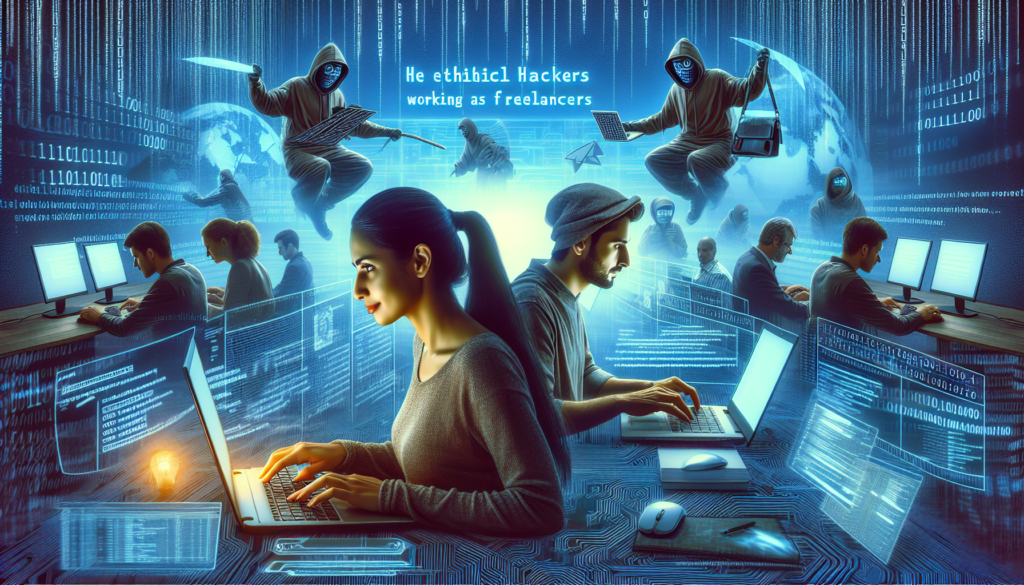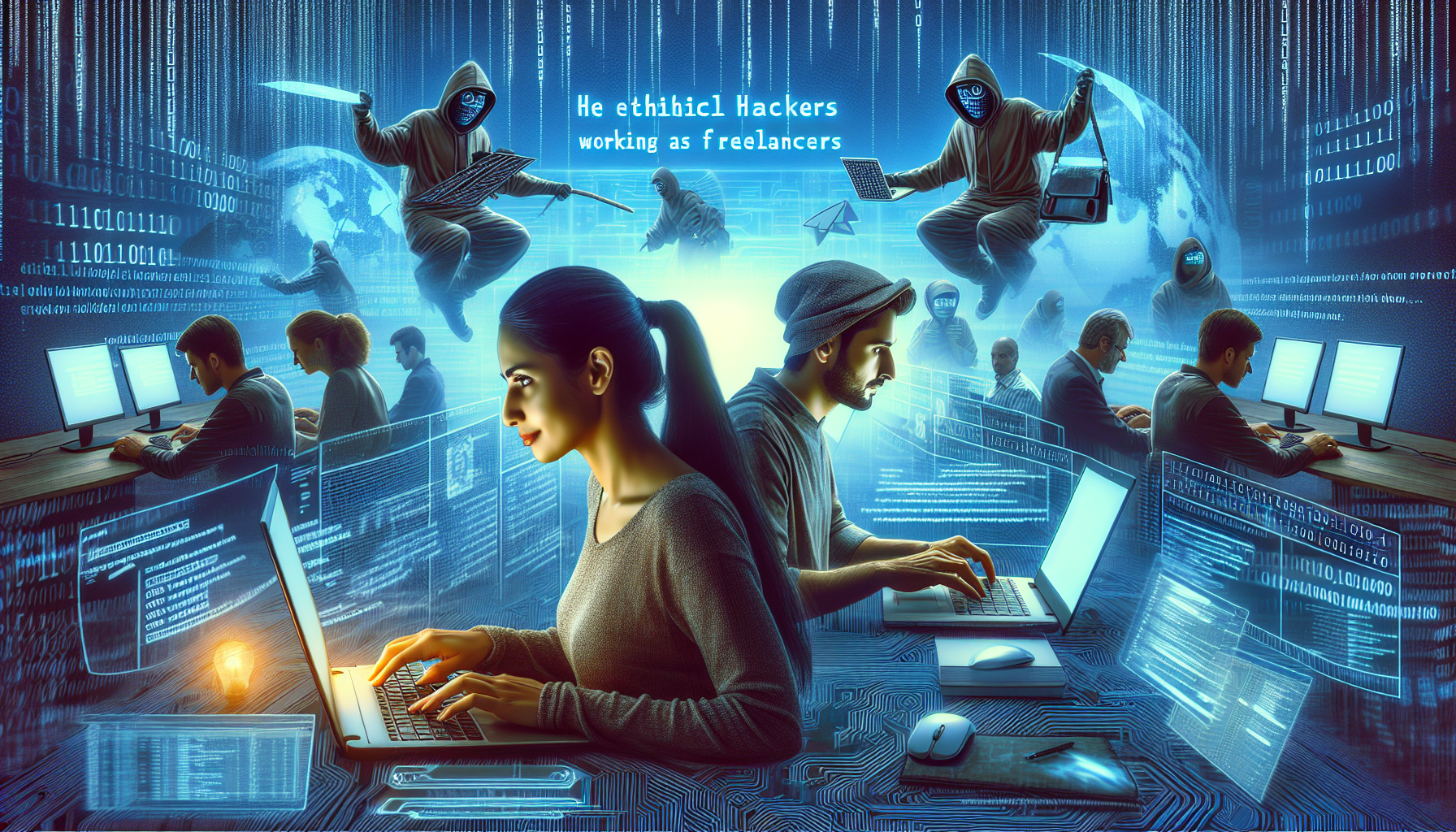As experienced professionals in the field of cybersecurity, we understand the critical importance of protecting sensitive data and securing digital infrastructure. In today’s digital age, the rising threat of cyberattacks necessitates the intervention of skilled experts who possess a deep understanding of hacker mindsets and methodologies. Enter the world of ethical hacker freelancers – individuals who utilize their technical prowess to identify vulnerabilities within systems, offering their services to help organizations fortify their defenses against malicious actors. In this article, we explore the role of ethical hackers and the benefits they bring, shedding light on the dynamic world of freelance cybersecurity.

The Role of an Ethical Hacker Freelancer
Defining ethical hacking
Ethical hacking is the practice of intentionally and legally attempting to penetrate computer systems and networks to uncover vulnerabilities and weaknesses. Unlike malicious hackers, ethical hackers use their skills for constructive purposes, aiming to identify and rectify security flaws before they can be exploited by cybercriminals. As ethical hacking requires a deep understanding of technology, it is crucial for freelance ethical hackers to possess technical expertise and adhere to strict ethical and legal standards.
The freelance industry
The freelance industry has seen significant growth in recent years, offering professionals the freedom to work independently and choose their own projects. Ethical hackers have also embraced this trend, opting to work as freelancers to leverage their expertise and find diverse and stimulating projects. Being a freelance ethical hacker allows individuals to have control over their work, pursue their passion, and enjoy the benefits of a flexible schedule.
The demand for ethical hackers
In today’s highly interconnected and digitized world, the demand for cybersecurity professionals, including ethical hackers, has skyrocketed. Businesses and organizations are recognizing the critical importance of safeguarding their digital assets and preventing potential breaches. By engaging ethical hackers, companies can proactively identify and resolve vulnerabilities, fortify their defenses, and protect sensitive information. This increased demand for ethical hackers makes it an opportune time for aspiring freelancers to enter the field and build a successful career.
Skills and Qualifications Needed
Technical expertise
To excel as an ethical hacker freelancer, it is essential to possess comprehensive technical knowledge and expertise. A strong understanding of computer networks, operating systems, and programming languages is crucial. Proficiency in cybersecurity concepts, such as intrusion detection, encryption, and vulnerability assessment, is vital for effectively carrying out ethical hacking activities. Continuous learning and staying updated with emerging technologies and hacking techniques are also crucial for success in this field.
Certifications and education
While a formal education in computer science or cybersecurity can provide a solid foundation, certifications specific to ethical hacking are highly coveted in the industry. Certifications such as Certified Ethical Hacker (CEH), Offensive Security Certified Professional (OSCP), and Certified Information Systems Security Professional (CISSP) demonstrate proficiency in ethical hacking and validate professional credibility. Successful completion of relevant certifications not only enhances one’s technical knowledge but also serves as a valuable asset when approaching potential clients.
Problem-solving and analytical skills
Being an ethical hacker requires the ability to think critically, analyze complex situations, and find creative solutions to security challenges. Freelancers in this field must possess exceptional problem-solving and analytical skills to identify vulnerabilities, determine their root causes, and devise effective countermeasures. The ability to think like a hacker is crucial in anticipating potential threats and securing systems accordingly. Additionally, strong communication skills are vital for effectively conveying findings and recommendations to clients.
Building a Successful Ethical Hacker Freelance Career
Creating a professional portfolio
To establish credibility and attract clients, freelance ethical hackers should create a comprehensive and professional portfolio. The portfolio should showcase past projects, successful security assessments, and any relevant certifications or qualifications. Including testimonials and recommendations from satisfied clients further strengthens the portfolio. Additionally, freelancers can consider contributing to open-source projects or publishing research papers to demonstrate their expertise within the hacking community.
Networking and building contacts
Networking and building a strong professional network are essential for finding freelance opportunities as an ethical hacker. Connecting with like-minded professionals, attending industry events, and participating in relevant online forums or communities can help freelance ethical hackers expand their contacts. Building relationships with cybersecurity firms, IT professionals, and potential clients can lead to new work opportunities and referrals.
Marketing oneself as a freelancer
To thrive in the competitive field of ethical hacking freelancing, effective self-marketing is crucial. Freelancers should develop a personal brand and maintain a strong online presence. This includes creating a professional website, utilizing social media platforms, and showcasing expertise through blog posts or whitepapers. Actively engaging with the cybersecurity community, sharing insights and participating in discussions, can help freelancers gain visibility and establish themselves as thought leaders.

Finding Clients as an Ethical Hacker Freelancer
Platforms and websites for freelancers
Various online platforms and websites specialize in connecting freelancers with clients seeking ethical hacking services. Websites such as Upwork, Freelancer, and Guru provide freelancers with a platform to showcase their skills, bid on projects, and secure work from clients worldwide. Additionally, specialized cybersecurity job boards and forums, such as HackerOne and Bugcrowd, offer opportunities specifically tailored to freelance ethical hackers. Actively monitoring these platforms and engaging with potential clients can lead to steady work and successful collaborations.
Targeting specific industries
Certain industries have a higher demand for ethical hacking services due to the nature of their operations and the sensitivity of their data. Key sectors include financial services, healthcare, government, and e-commerce. Freelancers can target these industries by focusing their marketing efforts, tailoring their portfolio to highlight relevant experience, and actively researching industry-specific cybersecurity challenges. Establishing expertise in a particular sector can increase the chances of securing projects and obtaining long-term clients.
Leveraging social media
Social media platforms provide a valuable opportunity for freelance ethical hackers to promote their skills and connect with potential clients. Creating professional profiles on LinkedIn, Twitter, and relevant cybersecurity-focused platforms can help freelancers showcase their expertise and engage with industry professionals. Sharing informative and educational content, offering insights into emerging threats, and participating in relevant discussions can help build a strong online presence, establish credibility, and attract attention from prospective clients.
Maintaining Ethical Standards
Understanding legal and ethical boundaries
As ethical hackers, freelancers must maintain a strong commitment to ethical conduct and adhere to legal boundaries. It is crucial to operate within the law, respecting client agreements, and obtaining appropriate permissions before conducting any security assessments. Understanding and following regulations, such as the General Data Protection Regulation (GDPR) or Health Insurance Portability and Accountability Act (HIPAA), is essential when handling sensitive data. Upholding these legal and ethical standards is vital for maintaining professional integrity and building trust with clients.
Communicating with clients about rules and objectives
Effective communication with clients is key to maintaining ethical standards and ensuring a clear understanding of project goals and boundaries. Before starting any engagement, freelancers should establish open and transparent communication channels with clients. This includes discussing project objectives, scope, and the rules of engagement. Clearly defining the limitations of the assessment, the data to be accessed, and the timeframe helps establish trust and prevents any misunderstandings that could compromise ethical conduct.
Documenting ethical processes
To maintain ethical standards and demonstrate transparency to clients, freelance ethical hackers should document their ethical processes and methodologies. Detailed reports should be provided to clients, highlighting the vulnerabilities identified, the potential impact, and recommendations for remediation. Such documentation not only protects clients from future attacks but also serves as evidence of the freelancer’s professionalism, ethical conduct, and commitment to cybersecurity best practices.
Managing Finances and Security as a Freelance Ethical Hacker
Setting competitive rates
Determining appropriate rates is crucial for freelance ethical hackers to ensure fair compensation for their expertise and efforts. Freelancers should consider factors such as their experience, certifications, project complexity, and market rates when setting their rates. Researching prevailing rates in the industry and consulting with fellow professionals can help freelancers gauge pricing benchmarks. Providing transparent pricing structures to clients, including options for hourly or per-project rates, enhances professionalism and facilitates negotiation.
Securing contracts and ensuring fair payment
As with any freelance work, ethical hackers should secure contracts that outline the scope of work, deliverables, timelines, and payment terms. Legal contracts protect both parties and provide a clear understanding of responsibilities and expectations. Freelancers should ensure that clients are aware of their payment policies and establish payment milestones throughout the project to minimize financial risks. Utilizing secure payment platforms or escrow services can further protect freelancers from non-payment or disputes.
Protecting client data
Ethical hackers have a unique responsibility to safeguard client data and ensure its confidentiality. Implementing robust security measures, such as encryption, multi-factor authentication, and secure file sharing, helps protect sensitive information from unauthorized access. Freelancers should strictly adhere to data protection policies, securely store client information, and regularly update security measures to mitigate potential risks. Maintaining strong cybersecurity practices not only protects the freelancer but also builds trust with clients, enhancing their reputation in the industry.
Challenges and Risks of Freelancing as an Ethical Hacker
Intense competition
The freelance ethical hacking industry is highly competitive, with a large pool of skilled professionals vying for projects. Standing out amidst intense competition can be challenging, especially for newcomers. Staying updated with emerging trends, continuously learning new hacking techniques, and building a strong professional network can help freelancers differentiate themselves and secure lucrative opportunities. Investing time and effort in personal branding and marketing efforts is essential to overcome the challenges posed by competition.
Risk of data breaches
Despite their ethical purpose, freelance ethical hackers handle sensitive information during security assessments. The risk of accidental data breaches is a significant concern, as even a minor lapse in security could have severe consequences. Implementing robust data protection measures, following best practices, and staying up to date with emerging threats are crucial for minimizing the risk of data breaches. Ethical hackers must take extra precautions to protect client data, including adequate disposal of sensitive information upon project completion.
Maintaining work-life balance
Freelancing offers flexibility, but it also presents the challenge of maintaining a healthy work-life balance. To prevent burnout and maintain productivity, ethical hacking freelancers should establish clear boundaries between work and personal life. Setting realistic work hours, prioritizing self-care, and ensuring adequate time for personal pursuits are essential practices. Efficient time management, effective communication with clients, and the ability to delegate or outsource non-core tasks can also contribute to a better work-life balance.
Continuing Professional Development for Ethical Hackers
Staying up to date with the latest techniques
Technology and cybersecurity landscapes are ever-evolving, making it crucial for ethical hackers to stay updated with the latest hacking techniques, tools, and vulnerabilities. Actively following industry news, participating in webinars, and subscribing to reputable security blogs or newsletters keeps freelancers informed about emerging threats. Professional development should include continuous learning, experimenting with new technologies, and exploring emerging cybersecurity trends to maintain a competitive edge in the field.
Attending conferences and workshops
Conferences and workshops provide valuable opportunities for ethical hackers to learn from industry experts, gain insight into emerging trends, and network with peers. Events like DEF CON, Black Hat, and OWASP AppSec conferences offer a platform to showcase skills, engage in hands-on workshops, and connect with professionals from diverse cybersecurity backgrounds. Attending such events not only enriches knowledge and skills but also provides opportunities to collaborate and contribute to the ethical hacking community.
Contributing to the ethical hacking community
Active participation and contribution to the ethical hacking community can be immensely beneficial for professional development. Engaging with online forums, participating in bug bounty programs, and sharing insights through blogs or social media platforms can help freelancers establish credibility and expand their knowledge base. Contributing to open-source projects and collaborating with other ethical hackers foster a sense of community and facilitate continuous learning from peers, enhancing skills and professional growth.
Future Trends in Ethical Hacking Freelancing
Increasing demand for cybersecurity
As the reliance on technology continues to grow, the demand for cybersecurity professionals, including ethical hackers, will only increase. With more businesses recognizing the importance of proactive security measures, the need to identify and address vulnerabilities will continue to rise. Freelance ethical hackers will play a critical role in meeting this demand, as they offer specialized skills, flexibility, and cost-effective solutions to clients in need of robust cybersecurity measures.
Evolution of hacking techniques
As technology advances, hacking techniques will also evolve, requiring ethical hackers to stay ahead of the curve. The emergence of new technologies such as artificial intelligence (AI), cloud computing, and Internet of Things (IoT) presents both opportunities and challenges. Freelancers should keep abreast of emerging technologies and understand their inherent vulnerabilities to effectively protect systems and networks. The ability to adapt and stay at the forefront of new hacking techniques will be crucial for freelance ethical hackers to remain relevant in the industry.
Emerging ethical hacking specializations
The field of ethical hacking is vast and diverse, presenting freelancers with opportunities to specialize in specific areas. Specializations such as web application security, mobile security, and IoT security are gaining prominence as businesses increasingly embrace these technologies. Freelancers can differentiate themselves by becoming experts in niche areas, allowing them to cater to specific client needs and command higher rates. Staying ahead of emerging trends and acquiring specialized knowledge will be key to capitalizing on these emerging ethical hacking specializations.
Conclusion
As the demand for robust cybersecurity measures continues to rise, the role of ethical hackers as freelance professionals becomes increasingly important. With the right skills, qualifications, and marketing strategies, ethical hacker freelancers can build successful careers in the ever-changing landscape of cybersecurity. By continuously honing their skills, adhering to ethical standards, and staying ahead of emerging trends, freelance ethical hackers can not only ensure their professional success but also contribute to safeguarding the digital world.
